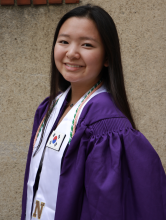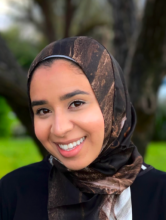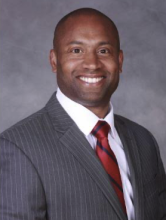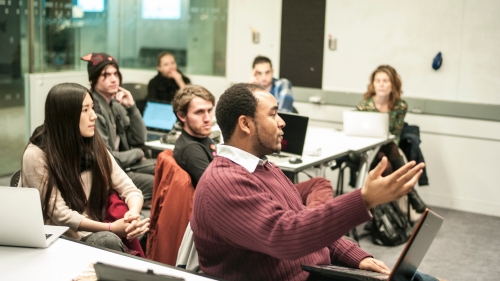Graduation student speakers Joyce Chung, Hanna El-Haddad, and Rob Lowe share their favorite NYU Steinhardt memories, their plans for the future, and their advice for others in their fields.
Joyce Chung
Bachelor's, Department of Communicative Sciences and Disorders

Tell us about yourself! What did you study at NYU Steinhardt? What kind of extracurriculars were you involved in?
Hi! My name is Joyce. I’m a senior at NYU Steinhardt studying Communicative Sciences Disorders (CSD) and Global Public Health, with a minor in American Sign Language.
Some more about me: My hometown is Tenafly, New Jersey and I am the proud daughter of Korean immigrant parents. I also just completed my honors thesis on the use of biofeedback technology for second-language learning under the mentorship of Dr. Tara McAllister at the NYU Steinhardt Biofeedback Intervention Technology for Speech (BITS) Lab.
I’ve had the chance to be a part of so many amazing extracurriculars during my time at NYU. During my freshman and sophomore years, I served as co-director of Kesem NYU, which is a non-profit organization that supports kids impacted by a parent’s cancer in the NYC community. Since COVID began, I have also been volunteering as a crisis counselor for the Crisis Text Line, providing a safe space for anyone experiencing a moment of crisis to be heard and understood. Lastly, I am the president of the NYU chapter of the National Student Speech Language Hearing Association. Through this role, I’ve had the pleasure of organizing fun events that bring CSD students together.
What is your favorite memory from your experience here?
I absolutely loved partaking in the cadaver lab as a part of the Anatomy and Physiology of the Speech and Hearing Mechanism course. Every week, we visited the NYU Langone medical center to see anatomical structures firsthand and it was a great way to reinforce the content we learned in class. This experience was also what sparked my interest in medical speech-language pathology and working in a healthcare setting in the future.
What are your plans after graduation? Where do you see yourself in three years?
After graduation, I am so excited to start my master’s in speech-language pathology at Boston University!
In three years, I will most likely be in my clinical fellowship year, which is required before gaining licensure as a speech-language pathologist. I’m not 100% sure about what setting I will be in, but I’m hoping to provide bilingual speech therapy and serve children with medically complex conditions.
What advice do you have for students in your field or program?
I always tell underclassmen to try to get involved in research! Oftentimes, students are intimidated by research and are hesitant to get involved, but the CSD department makes opportunities very accessible. Enrolling in one of the many two-credit, lab-based research courses is a great way to get your feet wet. If you end up enjoying the research environment, you can take up an honors thesis and work with a faculty mentor to explore your own topic of interest. I have grown so much through research, from honing my problem-solving skills to learning how to manage data – it’s been one of the highlights of my NYU experience, for sure!
Hanna El-Haddad
Master's, Department of Communicative Sciences and Disorders

Tell us about yourself! What did you study at NYU Steinhardt? What kind of extracurriculars were you involved in?
I studied Communicative Sciences and Disorders at NYU Steinhardt. As a new speech-language pathologist, I am passionate about pediatrics, specifically the cleft and craniofacial populations. I hope to serve this population in ways that are culturally competent because all children deserve equity and the opportunity to thrive.
What is your favorite memory from your experience here?
My favorite memory includes supporting a nonverbal client who was able to say their first words ever during a therapy session. That moment affirmed the power of this work and its capacity to empower clients from all walks of life.
I also carry incredible memories with my peers and classmates from across the country. The warmth of my peers gave me the strength to succeed through the pandemic.
What are your plans after graduation? Where do you see yourself in three years?
Post-graduation, I hope to branch out into the cleft world and serve families affected by a cleft lip and palate diagnosis through speech therapy and community leadership. I am currently publishing my first children’s book to empower children born with cleft lip and palate. In the future, I hope to become a strong advocate, therapist, and leader for the cleft community.
What advice do you have for students in your field or program?
If I were to give one piece of advice to future students in the field, it would be to seek knowledge rather than to learn knowledge. The distinction between seeking and learning is the drive needed to help you make a difference for your next client rather than your next exam. Seeking grounds you in your purpose and allows your drive and passion to far exceed your graduation date. Purposefully seeking knowledge propels you to be the best version of yourself because every client encounter can create a difference.
Rob Lowe
Doctoral, Department of Administration, Leadership, and Technology

Tell us about yourself! What did you study at NYU Steinhardt? What kind of extracurriculars were you involved in?
I am a police executive with more than two decades of experience in a diverse urban community. My leadership experience includes leading teams through organizational change and critical incidents. I provide subject matter expertise on a variety of police reform-related topics. I hold a Doctor of Education in Leadership and Innovation and have a strong academic interest in exploring the intersection of implicit bias and policing.
My dissertation, titled Reducing the Influence of Implicit Bias in a Municipal Police Department, examined how implicit bias impacts police officer decision-making. I also hold a Juris Doctor and have been a member of the Massachusetts Bar for over a decade. I am a graduate of the National Preparedness Leadership Institute at Harvard University and the Federal Bureau of Investigation National Academy at Quantico, VA.
What is your favorite memory from your experience here?
My favorite memory was learning from distinguished faculty and cross-sector executive cohort members who applied the curriculum to real-world experiences.
What advice do you have for students in your field or program?
The Doctor of Education in Leadership and Innovation is a unique program that is designed for a professional working full time. My advice to future cohorts is to "Trust the process."

